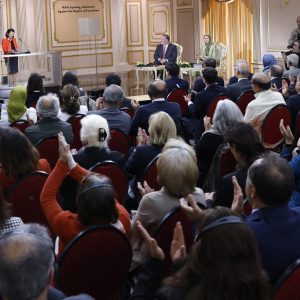Mike Pompeo, the former US Secretary of State, on Friday underscored that one year after the beginning of the uprising against the ruling theocracy in Iran in September 2022, the regime is doomed to fail, and these protests are “aimed at a democratic, free republic of Iran that is devoid of any form of dictatorship.”
Pompeo was speaking in a conference with the presence of Iranian opposition leader Maryam Rajavi.
Rajavi is the President-elect of the National Council of Resistance of Iran, the democratic coalition of Iranian opposition movements. The main Iranian opposition movement, the People’s Mojahedin Organization of Iran (PMOI or MEK) is the key constituent of the NCRI.
“No matter what the regime does, it is doomed to fail. Even as important, change in Iran can only be achieved by those who have been working toward it for decades, those who have paid the price for it and contain the organizational structure to accomplish that objective. These things do not happen on their own. Finally, for the future, U.S. policy towards Iran has to be centered around support for this organized opposition and increasing pressure on the regime until it falls,” Secretary Pompeo said, adding, “Iran will never return to the dictatorship of the Shah, nor will it settle for the current theocracy in Iran.”
According to Secretary Pompeo, “The organized resistance led by the MEK, every day is increasing its capability. It is delivering an even bigger push. Your work has made it far more difficult for the IRGC to inflict its brutal terror and mayhem on the people of Iran. Their numbers continue to grow. And despite mass arrests, the Iranian regime knows it’s on its back foot.”
Iranian opposition leader Maryam Rajavi provided an assessment of the trend of developments in Iran since last year. “Society’s readiness to continue the protests has increased, despite massive repression. Khamenei and the IRGC cannot prevent the eruption of this volcano. Western governments have largely helped the regime. For example, the easing of sanctions has increased the regime’s oil revenues. However, Khamenei and his criminal president, Ebrahim Raisi, have failed to break the regime’s deadlock. Economic and social crises have intensified and social discontent has increased. The social impact of the People’s Mojahedin Organization of Iran and the NCRI has significantly improved inside the country over the past year,” she said.
According to Rajavi, “The core issue is the regime’s fear of a nationwide movement that is ready for a fundamental change in Iran.
“Despite the arrest of thousands of members of the (MEK affiliated) Resistance Units, their network has expanded in many provinces. The Resistance Units were able to organize 3,700 anti-repression operations and tens of thousands of acts of protest last year. Only during the brief period of the anniversary of the uprising, they had more than 400 acts of protest,” she added.
Pompeo and Rajavi strongly condemned what they described as western countries’ appeasement policy toward the Iranian regime, including the recent release of six billion dollars of the regime’s frozen assets.
Rajavi pointed out that in order to justify the appeasement policy, the proponents of the Iranian regime claim that “if the regime is toppled, the situation will get worse, the regime is capable of containing the protests and most importantly they deny the existence of any credible alternative and say that the MEK does not enjoy any support in Iran.
“The MEK has developed a vast network inside Iran. For this reason, the regime has stepped up its attacks on the MEK to counter the advances of the Resistance. Inside Iran, they do this by suppression. On the international level, they do it by demonization and by asking other governments to impose restrictions on the Iranian Resistance. In this way, the regime tries to keep its balance,” Rajavi added.
The Iranian opposition leader vowed, “The Iranian people are determined to overthrow the religious dictatorship. They reject all kinds of dictatorships, including both the Shah and the mullahs.”

The former Secretary of State pointed out “It was appalling that the Office of Special Envoy for Iran at the State Department, in the midst of the Iranian uprising, chose to focus his attacks on the MEK instead of supporting protesters that sought to please the Ayatollah, even using the same words that were used by the regime. Let me be clear. Attacks against those who seek freedom and democracy in Iran is deplorable, whether it comes from my government or anywhere else. No patriotic American, Republican or Democrat, should want this.”
Pompeo described the attack on Asharf-3 in the Balkan country of Albania, on June 20 “appalling.”
Ashraf-3 is home to thousands of MEK members who have built a modern community near the port city of Duress in Albania in the past few years.
He said, “To no one’s surprise, the attack was highly and repeatedly celebrated by the regime in Iran and its top leaders. Indeed, they simply demanded more attacks, more extradition, more destruction of these freedom fighters.
“We should be clear. It was the Biden administration’s policy of appeasement towards Iran that left Ashraf 3 residents vulnerable to this very attack and to further intimidation. When we show deference to the Ayatollah and his cronies, their victims, their victims lose our protection…The United States should do everything in its power to help the Albanian government withstand threats, intimidation, and blackmail by the Iranian regime.”

